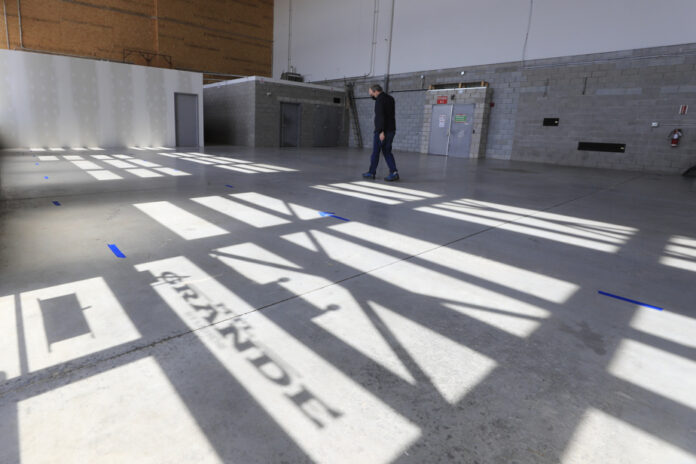The resolution of the labor dispute between the actors and the major Hollywood studios marks the conclusion of a very difficult year 2023 for the filming industry in Quebec. You can almost hear the huge sigh of relief.
On Wednesday evening, the American actors’ union, SAG-AFTRA, announced that it had reached an agreement with the Alliance of Motion Picture and Television Producers (AMPTP) after 118 days of strike. The standoff resulted in the obtaining of a new three-year collective agreement valued at “more than a billion dollars,” according to a press release from SAG-AFTRA.
In Quebec, the news brought notable relief to the audiovisual sector. “I am relieved for them, but also for us, for our industry,” underlines the president of the Union of Artists (UDA), Tania Kontoyanni.
At the Quebec Cinema and Television Bureau (BCTQ), there was fear that an extension of negotiations by just a few days would stretch the strike until January, or even until February, given the holidays planned in the United States in over the next few weeks (Thanksgiving, Christmas, New Year’s Day).
“We have suffered significant impacts,” underlines the president and CEO of the BCTQ, Christine Maestracci. And it’s not over. […] In terms of visual effects, it should take six, seven or eight months before we talk about a reshoot. »
On the side of the Quebec technicians’ union, AQTIS 514 IATSE, we welcome this news with enthusiasm, but caution, since the members of SAG-AFTRA have not yet ratified the agreement in principle.
“We are very happy for our members,” declares the president of the group, Christian Lemay. Our industry has suffered too much. That should revive her. »
This relaunch, which many observers are really expecting in January, after a period of six to eight weeks, will begin in just a few days at Studios Grandé in Montreal. On hold since June, production of Ghosts, a CBS network series, will restart on Monday, confirms Andrew Lapierre, vice-president and co-founder of the company, which hosts several foreign shoots in Quebec each year.
“We are also in talks with Sony. They are ready. They were waiting for the end of the conflict to restart the machine. Our studios will be full at the beginning of December,” adds Andrew Lapierre.
According to our information, the filming of an Apple TV series which was to begin in October, The Last Frontier, and a major Skydance production (Mission: Impossible, Top Gun) will arrive in town in the coming days.
Despite this good news, like several players in the sector, Studios Grandé will record revenue losses in 2023. The company was also preparing to implement a plan to reduce the workforce before Wednesday’s announcement . “It’s major,” says Andrew Lapierre.
“Companies told us that they had to lay off a lot of people,” adds Christine Maestracci of the BCTQ.
The situation is not much rosier on the technician side. Revenue losses are estimated at $60 million, confirms AQTIS 514 IATSE. “Among our members, because of the strikes [American screenwriters also walked off the job for five months earlier this year], many had to dip into their registered retirement savings plan,” says Christian Lemay. It’s sad, because these are their only savings. Freelancers have no pension funds in our industry. »
To ensure we get off to a good start, the BCTQ, Studios Grandé and MELS are asking the François Legault government to quickly review the tax credits granted to foreign productions, to allow Quebec to remain competitive and attract more productions. of scale in Montreal.
“We were already losing momentum before the strikes,” she adds. We were heading towards a year of 8 foreign shoots, whereas we are used to hosting between 25 and 40.”
The labor conflict between actors and major studios in the United States was closely followed in Quebec by the UDA and the AQTIS 514 IATSE. This fall, the two union organizations are also negotiating to renew their collective agreement with the Association québécoise de la production media (AQPM).
The discussions are progressing “well”, indicates Hélène Messier, president and CEO of the AQPM. “The negotiation tables continue. The parties meet regularly, several times a week. It going. There is no agreement in principle on the horizon, but the parties are in good faith. There is listening. »
In a telephone interview, Hélène Messier explains that she wants to find a settlement without “too weakening” an industry which is clearly not doing well. Last week, TVA Group announced the layoff of 547 employees.
“The industry has had better years,” she summarizes. Financing is difficult because of the state of the broadcasters. When their income falls, so does their ability to contribute to production. This year, we are observing a decrease in production volume of 25% to 30% compared to 2022.”
“We are lucid. Losses of advertising revenue affect traditional broadcasters, notes Christian Lemay, of AQTIS 514 IATSE. On the other hand, the industry must take stock. The government must make a statement… Otherwise, is the next step to cut Quebec content from the screen? It risks having an impact on our television, our language and our culture. »
May 2: American screenwriters go on strike. Their requests relate in particular to royalties for the exploitation of series and films on the internet.
July 14: American actors also go on strike. In addition to higher wages, they demand a real percentage of profits, as well as better protection against artificial intelligence.
September 27: Writers’ labor dispute ends
November 9: Actors’ labor dispute ends. The union speaks of an agreement including “unprecedented” protection against artificial intelligence, a salary increase and a bonus system when a series is successful.















